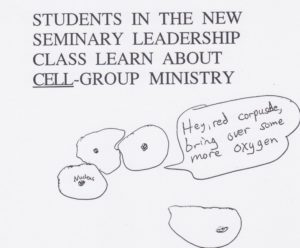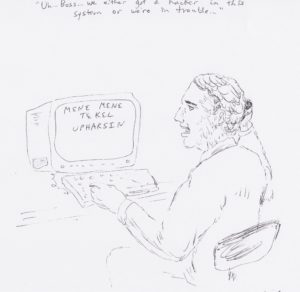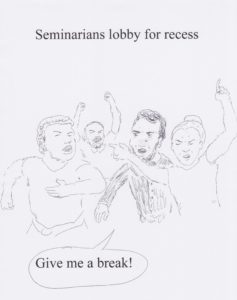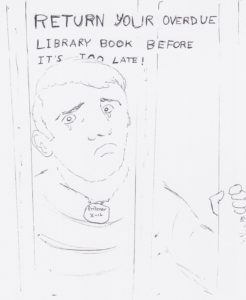Revelation is a practical book (5.42 minutes)
Revelation is a practical book. Some people get scared and confused by the images in Revelation, but it’s really a very practical book for our lives as Christians, with a message for how we can live. See:
Teaching about Miracles in Indonesia 4.1
24 minutes, from 2015, with Indonesian translation alongside the English
Meeting the holy God—Exodus 3:1-5
God sometimes meets us in the ordinary events of our lives, but calls us into his extraordinary plan for our lives. God met Moses in something as mundane as a bush, but quickly revealed to him that God himself is not mundane. God is holy, and wholly other.
In Exodus 3, God draws Moses’s intense curiosity with a burning bush that is not consumed. Moses turns aside to see “this great sight” (Exod 3:3)—this Hebrew term for the “sight” next appears in Exodus at 24:17, where the Israelites see the LORD’s glory “like a devouring fire” on the top of this mountain. God could reveal himself to his people as a devouring fire (Deut 4:24; 9:3). As Exod 3:3 describes what Moses saw, the beginning of verse 4 describes what God saw: when YHWH saw that Moses turned aside to see, then God called to him from inside the bush.
“Moses! Moses!” the Lord calls (Exod 3:4). The doubling of Moses’s name evoking God’s earlier poignant revelations to Abraham and Jacob (Gen 22:11; 46:2). Moses answers the same way his ancestors had: “Behold, I,” usually translated, “Here I am” (3:4). The response might be equivalent today to something like, “Yes, Sir. I’m here, listening up!”
“Don’t come closer,” God warned. Instead, Moses was told, “Take your shoes off your feet, because you’re standing on holy ground” (Exod 3:5). Later, God’s people could not come near God’s presence on the mountain (19:12-13, 21-25); likewise, only priests could enter the sanctuary and almost no one could enter the holiest place in the tabernacle (Lev 16:2; Heb 9:7). (God expelled Adam and Eve from Eden after they sinned; likewise, he would expel Israel from the land holy to him when they sinned, Lev 18:8; 20:22.)
God is holy and must be approached with reverence. There were appropriate times to have one’s shoes on (Exod 12:11), but not on holy ground (Josh 5:15), just as God’s people should not profane an altar by using tools on it (Exod 20:25). (Removing sandals could also be used for mourning, Ezek 24:17, 23, just as hiding one’s face [Exod 3:6] could, 2 Sam 15:30; Esth 6:12.) This was a conventional, cultural way of revealing respect. Christians in other cultures today may reveal our respect in other ways than taking off our shoes in church (especially if we have not washed our feet in awhile). The principle, however, remains. God is holy, and must be approached with our best signs of respect.
(For other posts on Exodus, see http://www.craigkeener.org/category/old-testament/exodus/.)
Mene Mene (Dan 5:25)
The genre of the Gospels with implications for them as historical sources
This is a video of a lecture I gave at Jakarta Theological Seminary in Indonesia some months ago, plus questions from students afterward. The full video is 3 hours, but you can skip ahead to parts you want. The second section is on the plausibility of miracle accounts in the Gospels.
Seminarians lobby for recess
God has not forgotten them—Exodus 2:23-25
When our lives become more comfortable, it’s easy to forget the hardship faced by others, whether through persecution, hunger, injustice or other needs. But God does not forget.
Moses’s life became peaceful in Midian (2:16-22), despite the scars his heart undoubtedly carried from the past. His people, however, continued to suffer in Egypt, a matter that the author’s inspired perspective directs us to in Exod 2:23-25. Just as Joseph’s exaltation in Genesis 41 did not relieve him of God’s plan to protect Joseph’s entire family (Gen 42—50), Moses’s new life has not caused God to forget God’s plan for Moses’s people.
Moses adopted his new way of life, but back in Egypt, even Pharaoh’s death did not relieve the Israelites. Pharaoh’s policy of repression remained in place for his successor. After all, oppressors who profit economically from oppression do not like to give it up. Probably the policy of directly killing male infants did not endure for many years, but if it did it may have raised a generation with less strength than ever to seek freedom by means of revolt. (Still, Israel has many men in Num 11:21. Because Israelite men could marry multiple wives and could continue to procreate into old age, children would continue being born. Since Pharaoh found the free work force profitable, and such a force required continuing free labor, Pharaoh presumably would have lifted the ban on male babies once the fear of Israel’s strength subsided.)
In any case, the Israelites’ suffering was deep. We are not told how much they had been crying to God before; it seems unlikely that their worship of other deities or deity images started only after they left Egypt (cf. Exod 32:4). The narrator does not even specify here that it was to God that their cry arose (cf. similar language of the Philistines in 1 Sam 5:10, 12; cf. Israelites in 1 Sam 4:13), although presumably many of them did (cf. Judg 3:9, 15; 6:6-7; 10:10). Samuel, however, later explains that the Lord heard when Israel cried out to him (1 Sam 12:8), just as they did in the time of Deborah (12:10).
God did not ignore his people’s suffering. He “heard” their groaning (2:24; 6:5) and “saw” them (2:25), and “remembered his covenant with Abraham, Isaac, and Jacob” (2:24). Here we are invited back to the narratives of God’s dealings with the patriarchs in Gen 12—35; God had not forgotten his people, and the promised time to liberate them from bondage, with many possessions (Gen 15:13-14), had come. May we have the wisdom to cry out to the Lord in times of hardship—and even in times when we are not suffering. We need the Lord, and the sooner that we recognize that, the sooner our cries will reach his ears.
Like Moses, our lives go on. After enduring hardship, we may need a time of recovery before having to face it again. But God does not forget the sufferings of others, and in the end, neither dare we. Remember Proverbs 24:11-12: “Rescue those being led away to death; hold back those staggering toward slaughter. If you say, ‘But we knew nothing about this,’ does not he who weighs the heart perceive it? Does not he who guards your life know it? Will he not repay everyone according to what they have done?” (NIV).
(For other posts on Exodus, see http://www.craigkeener.org/category/old-testament/exodus/.)
Better turn in your overdue library books now!
What is the gospel of the kingdom?
The good news of God’s reign: we have a foretaste already of the not yet, although the fullness remains future at Jesus’s return:




